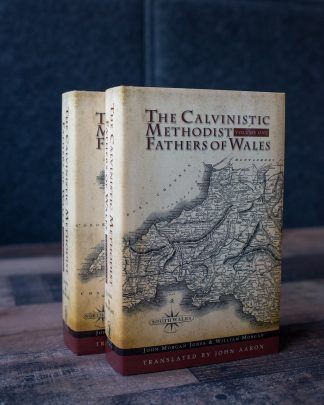The Calvinistic Methodist Fathers of Wales – A Review
VOLUME 1
This1 is a fascinating book which we found hard to put down. Really it tells the wonderful story of the Evangelical Revival in Wales in the eighteenth century. What amazing gatherings there were and what blessing!
Originally written in Welsh in 1895 by John Morgan Jones, assisted by William Morgan, this is the first time the work has been translated into English. The Welsh author writes in an interesting style, somewhat on the lines of Merle d’Aubigné, dealing with the subject in biographical fashion. He has a good grasp of doctrine and of Scripture, which he brings in in a most suitable way, and his comments are always helpful.
Apart from what must have been a prodigious labour of love, this is a magnificent translation by John Aaron. So often even the best translations seem to be involved and, in places, confused.
We have to say that though the book is most interesting, it is very long, and occasionally details of Association Meetings hold up the story – though this does not detract from its value.
There is more about the amazing Howell Harris (1714-1773) than anyone else. A great preacher, his ministry was wonderfully used by God. But he was the most humble, self-effacing of men, and constantly bemoans his sin. For instance: ‘O wonderful love that I am not in hell, having tempted God so much!’ He felt that he was the ‘greatest wretch in the world’ (page 180). He was also somewhat impulsive like Simon Peter. (He certainly did and said some strange things at times!)
But what Howell Harris suffered for Jesus’ sake! We cannot forbear inserting the following, from September 1740 at Newport:
Harris’s clothes were torn, his wig stolen, and he was forced to stand bareheaded in the rain. ‘How sweet,’ he wrote, ‘to bear the reproach of Christ!’ Stones, rotten apples and mud were thrown at them . . . When Harris stood up to speak, much turmoil broke out. The people howled at him. They threw dung, eggs, and cherry stones at them.’ (page 171) [His friend Seward was hit with a stone and died a few days after.]
‘The windows were smashed and some of the rioters forced their way in, roaring like wild animals . . . The malicious mob, both male and female, fell upon him in the cruellest way. The women flung the dung of the street at him and the men beat him with their fists and staves, until his blood flowed freely . . . At one point he fell and was for a time trampled underfoot, so that he thought he would surely lose his life. (pages 172-3)
The emphasis of Volume 1 is on Howell Harris. In fact, the Howell Harris chapters, extracted and suitably edited, would make an excellent biography. When the author reaches Harris’s death, he sadly comments, ‘We find difficulty in bidding him farewell’ – and we felt exactly the same.
Apart from one or two ministers who are lesser known (to us in England) and many references to Whitefield and the Countess of Huntingdon, the two most important figures are Daniel Rowland (1713-1790) and William Williams (1717-1791). The accounts of Daniel Rowland’s preaching and its gracious effect are wonderful. It is very interesting that those who could understand both English and Welsh, in hearing Whitefield and Daniel Rowland concluded that the latter was the greater preacher! William Williams, ‘the sweet singer of Wales,’ is of course the well-known hymnwriter (the author of ‘Guide me, O Thou great Jehovah’), but he was also an eminent preacher. It is interesting to note that the publication of his hymns was greatly used by God in working in sinners’ hearts.
There are a few surprising things in the history of the Welsh Calvinistic Methodists. One is that until the nineteenth century they counted themselves part of the Church of England, and had not much union with the Independents or the Baptists. The other: there was a lot of controversy, at times bitter, among the leaders; they were only men at best.
We could not agree more with the Publishers’ assessment: ‘stimulating and enjoyable . . . exciting.’ The Calvinistic Methodist Fathers of Wales (originally Y Tadau Methodistaidd) is also a spiritual book. The Calvinistic Methodists abhorred both Arminianism and Baxterianism. And lengthy extracts from Howell Harris’s diary ensure the spiritual content of the book.
It would be a good thing if there were more interest in some of the glorious happenings in the church of God in former years. We know that we were delighted to receive these two volumes.
We look forward to reading Volume 2 (which contains Thomas Charles and John Elias).
Notes

The Calvinistic Methodist Fathers of Wales
2 Volume Set
price $58.50Description
VOLUME 1 This1 is a fascinating book which we found hard to put down. Really it tells the wonderful story of the Evangelical Revival in Wales in the eighteenth century. What amazing gatherings there were and what blessing! Originally written in Welsh in 1895 by John Morgan Jones, assisted by William Morgan, this is the […]
Taken with permission from The Gospel Standard, December 2008.
Latest Articles
Finished!: A Message for Easter March 28, 2024
Think about someone being selected and sent to do an especially difficult job. Some major crisis has arisen, or some massive problem needs to be tackled, and it requires the knowledge, the experience, the skill-set, the leadership that they so remarkably possess. It was like that with Jesus. Entrusted to him by God the Father […]
Every Christian a Publisher! February 27, 2024
The following article appeared in Issue 291 of the Banner Magazine, dated December 1987. ‘The Lord gave the word; great was the company of those that published it’ (Psalm 68.11) THE NEED FOR TRUTH I would like to speak to you today about the importance of the use of literature in the church, for evangelism, […]
